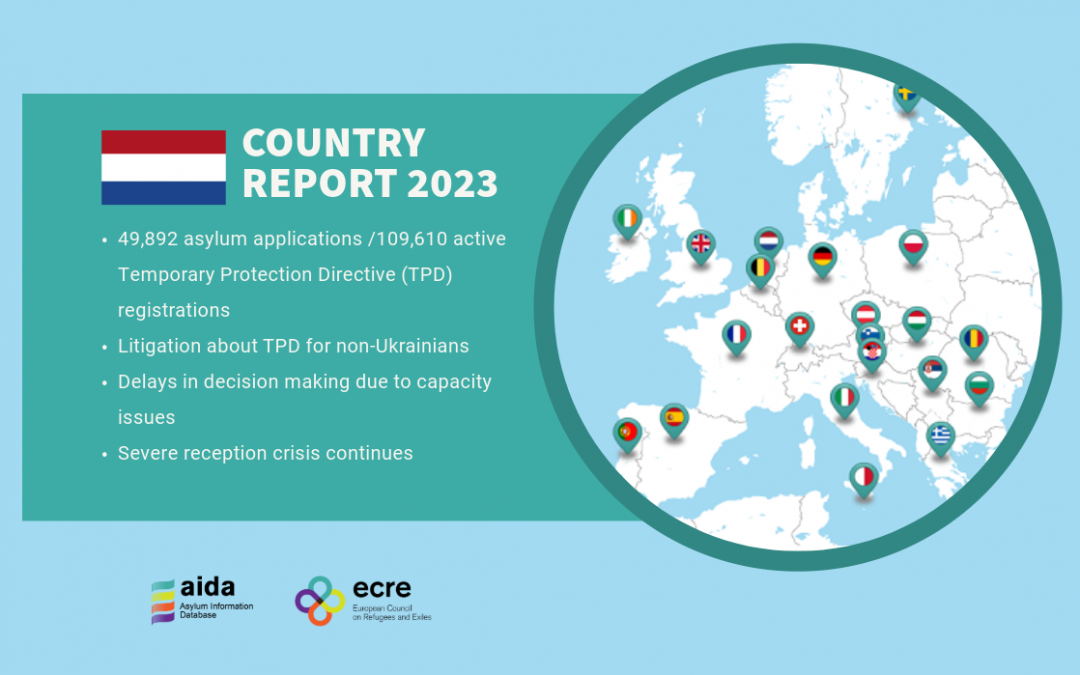The updated AIDA Country Report on the Netherlands provides a detailed overview of legislative and practice-related developments in asylum procedures, reception conditions, detention of asylum seekers and content of international protection in 2023. It also includes an annex which provides an overview of temporary protection (TP).
In 2023, a total of 49,892 people lodged asylum applications in the Netherlands (including subsequent applications and family reunification). Of the 38,377 first time applications (up from 35,535 in 2022), the most represented countries of origin were Syria (13,028), Türkiye (2,862) and Eritrea (2,345). The overall recognition rate at first instance was 80.2% (down from 87.2% in 2022). Over 72% of positive decisions granted subsidiary protection.
As of 12 April 2024, 109,610 displaced persons from Ukraine were actively registered in the Netherlands. The right to TP for non-Ukrainian nationals with a non-permanent residence permit in Ukraine was due to end on 4 March 2023. The State Secretary for Justice and Security then announced an extension until September, which the Council of State further extended to March 2024. Following individual proceedings and preliminary questions to the Court of Justice of the European Union, in April 2024, the government announced that the group would benefit from temporary protection until March 2025. TP applicants and beneficiaries also suffered from the country’s lack of reception capacity, which had led in delays to access registration (for which an address is required) and associated rights.
The capacity issues that had affected the asylum determining authority, the Immigration and Naturalisation Service (IND), did not improve significantly in 2023. The IND tried to address the situation through experimental procedural changes aimed at accelerating the decision-making process. This resulted in some requests being handled much faster whereas more complicated requests still had to wait several years for a decision. These pilots have mainly resulted in a more chaotic asylum procedure and less predictable interview and decision dates. Due to the lack of capacity, the derogation which allowed the IND to take decisions on asylum requests within 15 months rather than the normal six was extended for a third time in December 2023.
Regarding the Dublin Regulation, following divergent positions by regional courts, the Council of State ruled in April 2023 that the principle of mutual trust no longer applied to Italy. This was due to the latter’s December 2022 announcement about its lack of accommodation, which, according to the Council of State, would result in asylum seekers being left in a situation of severe material deprivation. Several regional courts also expressed concerns about the availability of reception in Belgium, particularly for single men. However, in March 2024, the Council of State ruled that the situation did not reach the level of several material deprivation as, although there were significant issues with Belgium’s asylum reception system, single men could seek to access alternative solutions such as homeless shelters. In addition, regional courts and the Council of State both issued decisions regarding the impact of pushback practices on the principle of mutual trust, especially in Bulgaria, Croatia, Poland, Romania and, to a lesser degree, Slovenia. The general conclusion was that although the existence of pushbacks is mostly undisputed, they occur on the outer borders and thus do not affect Dublin returnees.
Reception also continued to be a significant issue in 2023. Although no asylum seeker was forced to sleep outside the Ter Apel registration centre, urgent measures were taken throughout the year, often leading to distressing living conditions, including people having to spend several nights in the IND waiting area without mattresses or access to showers. In 2023, half of the people who were entitled to reception conditions were staying in (crisis) emergency centres, the majority of which still largely failed to meet the minimum obligations of adequate and humane accommodation under EU law. The recurring issues reported included lack of social safety and self-sufficiency, lack of privacy, inadequate nutrition, poor hygiene and lack of access to health care. The situation was particularly problematic for children and vulnerable people with unmet medical needs. The separate system for the reception of unaccompanied minors also continued to face severe capacity issues, leaving some children in conditions in which their physical and emotional safety could not be guaranteed.
In 2023, the IND published its general instructions on family reunification, including general guidelines regarding late submissions. The Council of State highlighted that a family reunification application could not be rejected on the grounds that the family member had entered the Netherlands through other means in the meantime. In these situations, the procedure could still be approved and a derived asylum permit delivered.
The full report is available here and the annex on temporary protection is available here.
For more information about the AIDA database or to read other AIDA reports, please visit the AIDA website.

